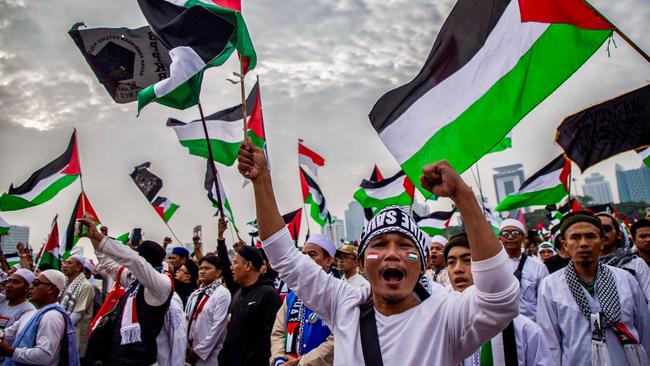Gaza boycott crippling US brands in Muslim South East Asia
In Indonesia many big US food chains are offering discounts, and even resorting to providing plain paper bags for takeaways.

When Malaysian Starbucks mogul Vincent Tan urged customers this week to end a crippling boycott of his coffee outlets over the conflict in Gaza that was hurting thousands of Muslim workers, he was highlighting a wider problem affecting some of America’s biggest brands across Muslim Southeast Asia.
“I think all those who are boycotting Starbucks Malaysia should know that it is a Malaysia-owned company,” said Mr Tan. “We don’t even have one foreigner working in the head office. In the stores, 80-85 per cent of employees are Muslims. This boycott doesn’t benefit anyone.”
The response – a social media pile on – was not what he had been hoping for. “All of a sudden the ultra-rich tycoon spoke up to gain sympathy from the people. Perhaps he just realised that the source of his wealth comes from the people,” one man, Wak Solihin, said on Facebook.
“Why can’t you just start a coffee chain … that isn’t affiliated with that particular regime? I reckon many Malaysians will flock to it,” suggested another.
The global boycott of US businesses perceived to support Israel’s continued bombardment of Gaza since Hamas’ October 7 terror attack on the Jewish state has slashed profits across Malaysia and Indonesia where majority Muslim populations overwhelmingly support the Palestinian cause and both governments have been critics of Israel’s retaliation.
Tan’s Berjaya Food, Starbucks’ Malaysia’s main franchise owner, reported a 38.2 per cent drop in revenue in its December quarter primarily “attributed to an ongoing boycott” linked to the fighting. The company’s stock has fallen more than 20 per cent since early October.
Starbucks Indonesia is also suffering as are McDonald’s, KFC, Unilever and others across Southeast Asia Muslim nations.
Fernando Fernandez, chief financial officer for Unilever which owns Ben & Jerry’s ice cream and Dove soap, said last month its Indonesia business had seen a “double-digit sales decline in the fourth quarter, as sales of several multinational companies were impacted by geopolitically focused, consumer-facing campaigns”.
McDonald’s reported a 16.5 per cent slump in sales growth in international markets in the final quarter of 2023, which it blamed in part on the Gaza conflict. “The most pronounced impact that we’re seeing is in the Middle East, and in Muslim countries like Indonesia and Malaysia,” CEO Chris Kempczinski said during a February earnings call. “So long as this conflict, this war is going on … we’re not expecting to see any significant improvement in (these markets).”
This week the Kuwait-based Alshaya Group, which owns Starbucks rights in the Middle East, confirmed plans to cut 2000 jobs.
An Indonesia-based chief executive for a US food chain told The Weekend Australian business was gradually improving after slumping more than 30 per cent in the initial weeks of the boycott but was still some way from full recovery.
In Indonesia many of the biggest US fast-food chains are offering discounts, while some have resorted to providing plain paper bags for takeaway customers worried about a potential backlash. Many have imposed hiring freezes that have disproportionately affected young people for whom the job market is already squeezed.
A 19-year-old Jakartan school leaver with a disability was to start working for McDonald’s in November but was told her contract had been deferred until business recovered. She said she still didn’t know when she would start work. “I think the boycott has gone on too long,” she said.
At a McDonald’s restaurant in Jakarta, a branch manager said the effect on business was more serious than during Covid, with trade down as much as 40 per cent in late 2023, improving marginally in the first months of this year.
He said the company had been trying to counter the boycott with good deeds such as weekly donations to community health posts and mosques, while the Malaysian-owned franchise donated cash to the Palestine Humanitarian Fund following a backlash over McDonald’s Israel donating free meals to Israeli soldiers.
Still, affected businesses are struggling to convince consumers that they have not taken sides in the conflict. Public notices such as a blog post on Starbucks Malaysia’s website insisting the company “stands for humanity”, has no political agenda, and no stores in Israel are so far failing to cut through.
Many are pinning their hopes on a Ramadan bounce during the Muslim fasting month and ensuing Idul-fitri feasting holiday.
Additional reporting Dian Septiari




To join the conversation, please log in. Don't have an account? Register
Join the conversation, you are commenting as Logout